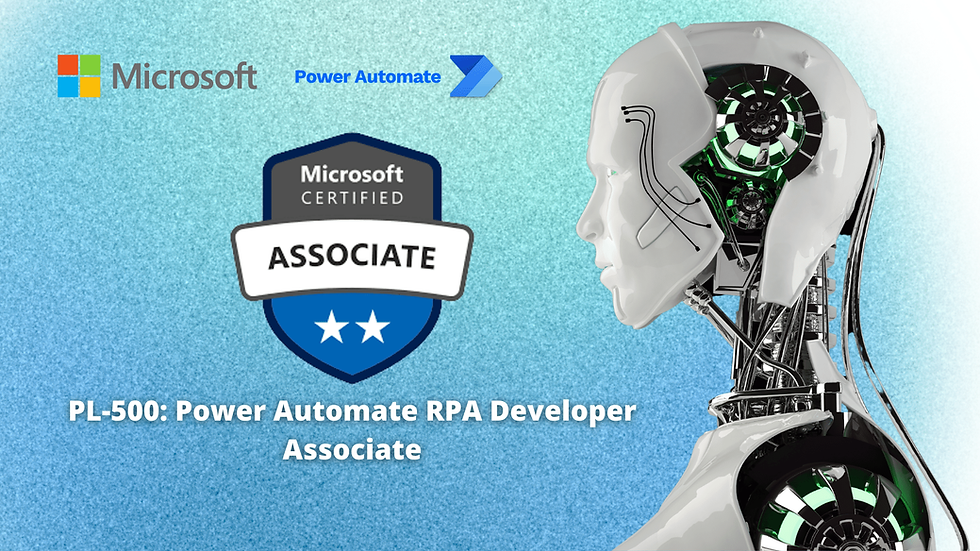Empowering Accountants: Elevating Efficiency with Power Automate and Embracing Generative AI
- Aug 18, 2023
- 3 min read
Updated: Jan 8, 2024

In the thriving hub of Seattle, Ashley Francis stands as a beacon of innovation in accounting. A Certified Public Accountant (CPA) specializing in ultra-high net worth individuals, family groups, partnerships, trusts, and estates, Ashley's practice exudes a profound dedication to leveraging technology for automating accounting processes.
She relentlessly pursues excellence and harmoniously integrates technology to provide her clients with exceptional service while advancing her industry expertise.
Unleashing the Power of Power Automate
At the core of Ashley's transformative journey is Power Automate, a low-code automation platform designed to revolutionize workflows by seamlessly connecting various applications and services. Automation has long existed in accounting software, going back to 1960. This process enabled companies to enter their financial information into a machine, which would perform calculations and generate reports as output.
Ashley's strategic utilization of Power Automate has yielded remarkable results across multiple domains:
Data Extraction Prowess: Ashley utilizes Power Automate to extract intricate data from investment bank statements and enter it into fiduciary accounting software. This automation streamlines processes that were once manual and time-consuming.
Financial Management Efficiency: The invoicing process is now a streamlined affair through Power Automate. Sending invoices and collecting payments has been meticulously automated, enhancing financial transactions for Ashley's clients.
Time Optimization and Communication: Beyond financial transactions, Ashley employs Power Automate to manage her schedule, set reminders, schedule meetings, and efficiently manage her email correspondence.
The Infusion of Intelligence: AI Builder and Power Automate
In a recent project, Ashley harnessed Power Automate to tackle a complex endeavour – extracting data from three years' worth of investment bank statements, each brimming with intricate trading activities.
The challenge lay in the data's integration into fiduciary accounting software. Undeterred, Ashley employed AI Builder to train a model to decipher the statement's format. This AI-enhanced model was then seamlessly integrated into a Power Automate flow. When documents were deposited into a specific folder, the flow harnessed the AI model to meticulously extract and organize the data into Excel.
Through this automation, Ashley extracted 800 lines of information, effortlessly dragging and dropping documents into a designated folder. Hours of laborious manual work were transformed into mere moments. With AI Builder continuously evolving, Ashley anticipates even smoother data extraction from investment statements in the future.
Pioneering Power Automate's Co-pilot Feature
Ashley's commitment to innovation is further reflected in her adoption of Power Automate's Co-pilot feature. This cutting-edge addition transforms the learning curve by enabling users to create flows through natural language communication.
A simple directive such as "Hey Co-pilot, create a flow that sends out invoices to my clients" triggers an intuitive process where Co-pilot seeks to understand the user's requirements before crafting the desired flow.
The Dawn of Generative AI: A Glimpse into the Future
Beyond Co-pilot, Power Automate introduces a realm of possibilities with Generative AI:
AI Builder's Potential: AI Builder is a vital component that facilitates model training on data, enabling tasks like data extraction from documents, classification, and text generation.
Generative AI Unleashed: Generative AI takes automation further, empowering users to create new content, whether emails, letters, or reports. This feature automates tasks like invoice generation, marketing emails, and comprehensive financial statements.
(Check out our Generative AI Course)
Charting a Transformed Future in Accounting
The potential that Power Automate and Generative AI hold for reshaping accounting processes is profound:
Streamlined Manual Tasks: Power Automate excels at automating manual tasks, from data entry to report generation. This shift releases valuable time for accountants to focus on strategic endeavours.
Elevated Efficiency: Efficiency gains are palpable as Power Automate optimizes workflows, leading to quicker turnarounds and reduced costs.
Enhanced Accuracy and Compliance: Reduction in manual intervention through Power Automate leads to fewer errors, ensuring accurate financial reporting and regulatory compliance.
Stricter Compliance: Automation facilitates adherence to regulations, automating tasks like data retention and audit reporting, minimizing the risk of penalties.
Conclusion
The future beckons unparalleled promise for accounting professionals venturing into this transformative landscape. Dive into the abundance of resources available online, in libraries, and through dedicated online courses. Equip yourself to master Power Automate and Generative AI, embracing a pioneering accounting role.
FAQ
What is Power Automate, and how does it differ from traditional automation in accounting?
Power Automate is a low-code automation platform that revolutionizes workflows by seamlessly connecting various applications and services. Unlike traditional automation methods, Power Automate offers a user-friendly approach and allows for intricate automation processes without requiring extensive coding knowledge.
What is the role of AI Builder in conjunction with Power Automate?
AI Builder is a significant component that facilitates training AI models on data, enabling tasks such as data extraction, classification, and text generation. When integrated with Power Automate, AI Builder enhances automation processes by adding intelligence to tasks, such as deciphering complex document formats or generating content like emails and reports.
What are the benefits of using Power Automate and AI training in accounting?
The benefits of using Power Automate and AI training in accounting include:
Increased efficiency: Automating manual tasks can free up time for accountants to focus on strategic endeavors.
Improved accuracy: Reducing manual intervention can help to reduce errors and ensure accurate financial reporting.
Enhanced compliance: Automation can help to improve compliance with regulations by automating tasks such as data retention and audit reporting.
Cost savings: Automating tasks can help to reduce costs by freeing up time and resources.





